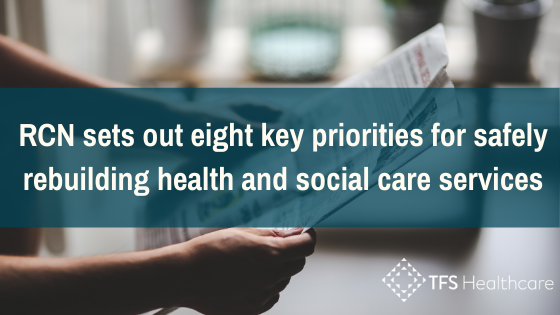It is 100 days since the pandemic was declared by the World Health Organisation on 11 March. To mark the date, the RCN have set out eight key priorities vital for the safety of healthcare staff and the general public following the initial peak of the pandemic.
The eight priorities set out by the RCN focus on the need for a supportive and considered approach to the mental health of nursing staff and other health care workers and committing to full and proper risk assessments; tackle underlying causes that contribute to placing BAME staff at heightened risk; ensure nurse leaders are equipped to future proof infection control and critical care capabilities; and support nursing students as they resume their studies.
RCN Chief Executive & General Secretary Dame Donna Kinnair said: “Nursing staff and other care workers across the UK have shown remarkable leadership, professionalism and commitment. But as we move past the peak of the epidemic, we must care for those who’ve been caring.
“It is vital that our governments and employers, including the NHS, take steps now to protect our health and social care services and staff, who have done such remarkable work at a time of crisis.
“The weekly clapping may have stopped, but the practical measures needed to fully support our health care staff are only just beginning.”
Eight Key Priorities
1. Full and proper risk assessments to control the risk of exposure to COVID-19 and that all identified risks are acted on. It is the employer’s responsibility to ensure staff are protected, which includes timely access to testing. Risk assessments must be reviewed regularly or following any incident or change in circumstances. No staff must be pressured to return to work when their individual risk assessment says otherwise.
2. The increased risk faced by Black, Asian, and minority ethnic (BAME) nursing staff must be considered in all actions and undertakings as services return. Further, employers and governments must tackle the underlying causes which have contributed to worse outcomes for BAME staff.
3. Capture and act on lessons learned during the pandemic in relation to staff raising concerns about personal protective equipment (PPE), equipment and staffing. Ensuring clear and accountable mechanisms are in place for staff to raise any concerns safely, in the knowledge that they will be dealt with fairly and without fear of redress. Staff must not be required or pressurised into working without the correct PPE for their environment.
4. Proper management and support for the health and wellbeing of nursing staff. This includes enabling staff to take breaks at work, their annual leave, and by reviewing and controlling working patterns to prevent long shifts or excess hours being worked.
5. A particular commitment for all employers to make available and fund timely access to confidential counselling and psychological support for all staff. Staff must be able to self-refer to these services.
6. Nurses in all sectors must lead the way in ensuring nursing staff can return to their substantive roles and service areas as soon as it is safe to do so.
7. Nurse leaders in all sectors must be given the authority and resources to transform, reopen and rebuild services safely. In doing so nurse leaders must be able to future proof the infection control and critical care capabilities and capacity achieved during the past 100 days. This must be done with consultation and the support of the RCN.
8. Recognising the particular contribution of all nursing students during the pandemic, a clear pathway is needed that allows nursing students to return to normal study as soon as possible and those from the current cohort to register in their original timeline.
Read the full article at rcn.org.uk


